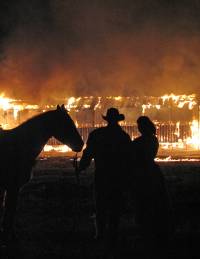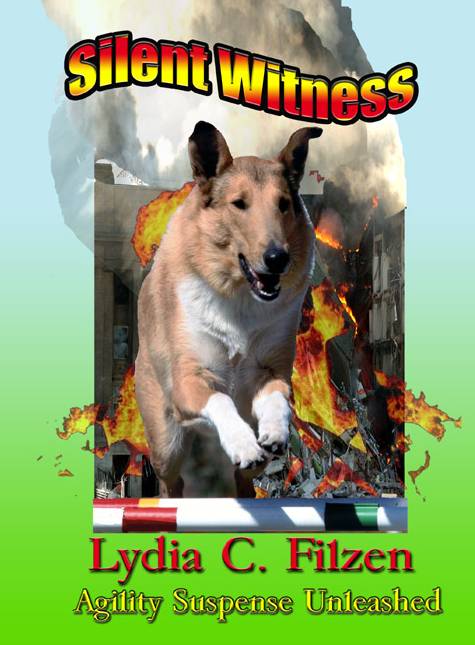|
Home
Biography
Firetrail - The Movie
Firetrail - Movie Gallery
Firetrail Excerpt
Perfect Disguise Excerpt
Perfect Disguise Movie
Exiles on the St. Johns
Raiders on the St. Johns
Books By Lydia Filzen
Foxfire Collies
Rainbow Bridge
Music by Jennifer Filzen



Seminole War Fort at Picolata
|
Lydia
Hawke presents:
|
Exiles
on the St. Johns
Excerpt From Chapter One
|
 Near Sharpsburg, Maryland Near Sharpsburg, Maryland
September, 1862
Over time, Jack Farrell had schooled himself to think of his targets as
objects rather than men. He was no murderer, just a skilled marksman.
Fellow skirmishers ran past as he claimed a likely spot. He dropped his
haversack and blanket at the bottom of the tree trunk, leaving his canteen and
cartridge box on his waist belt. He propped himself against the rough bark and
tightened the leg straps anchoring the climber gaffs to his shoes. The nearby
crackle of rifle fire, the boom of artillery, and the screech of shells
overhead made deadly music.
He swept his gaze upward, regarding the big oak tree, searching for the
best way to scale it. He studied the curve of the branches, gauging the climb
to the crotch of the tree, one well sheltered by leaves, still thick in early
autumn. The screen could serve him well.
Jack slung the Enfield musketoon rifle over his shoulder and unwound a
length of rope. He looped it around the trunk and started to walk up the tree
by sticking the triangular gaffs into the thick bark and pulling himself upward
with the rope.
Slim and tough, supple as a cat, he’d learned to translate his skill at
stringing telegraph wires along the Florida railway line into a more harrowing
job. He avoided catching the rifle or his equipment in the protruding boughs.
He crawled onto a substantial branch, and sitting astride, settled his back
against the main trunk. Judging his seat secure, he didn’t need to tie himself
to his perch. He shifted to unsling the rifle and cradled it in his arms.
The gray of his uniform jacket blended in with the shadows cast by the
foliage. He stared through the leaves at a battery a couple of hundred yards
away. Crack shots from his regiment had been selected to silence those
destructive guns. The blue-clad artillery crews swarmed around the cannons,
loading them with the exploding shells that had been creating havoc on his
side. His job was to disrupt their effectiveness.
Jack’s Enfield two-bander, equipped with a telescope to help focus on
targets and a shorter barrel to make it easier to handle in close quarters, was
the most practical rifle the Confederacy had so far found to equip its
marksmen. In the hands of a skilled shooter it proved deadly accurate.
Jack was such an expert.
He watched the blue-coated soldiers for a moment, studying their
placement and movements. The situation required haste but not at the expense of
wasting ammunition. He estimated the distance and considered trajectory. Then
he lifted the stock to his shoulder and braced for the recoil, taking into
account the three-inch space he needed between his eye and the telescope. Too
close, and the rifle’s kick would ram his face and give him a black eye.
Artillery horses made big, inviting targets, but he hated to kill them. They
had not volunteered to pull the caissons for the Union army.
He singled out an officer who paced behind the cannon, barking out
orders, his arm chopping. Jack sighted through the telescope, tracking him with
the muzzle of his rifle. He pushed aside a fleeting thought of his Yankee
brother. Dan isn’t an artillery officer. He led a little ahead of the
center of the man’s body and gently squeezed the trigger.
The bark of the black powder explosion spewed out the muzzle, sparing his
ears. The recoil bumped hard against his shoulder. He peered through the plume
of stinking smoke, reloaded and assessed the effect his handiwork had wrought.
Handling the muzzle-loader was an awkward process that would have been simpler
on the ground, but he was well practiced.
The blue-coated officer lay on the ground. Two crewmen rushed over to
their stricken leader, disrupting the sequence of firing the piece of
artillery.
The crack of a rifle to
his right reminded him he was not alone. Could be Bill, one of his messmates. A
crewman fell across the barrel of the cannon and slid off.
It was a painstaking but
effective process, keeping the artillerymen busy trying not to get shot. He
contributed his part to render the battery harmless, and from the crack of
rifle fire on either side, other skirmishers were on the job as well.
Jack lifted the rifle to
his shoulder again and trained his weapon on one of the men who had run to the
fallen officer. The Yankee whirled and froze like a pointer, looking in the sharpshooter’s
direction. Jack imagined the soldier staring into his eyes. He sighted the
stationary target, ready to fire a bullet into the fellow’s chest.
But the Yankee moved out
of the scope’s field. Jack swung the barrel by degrees until he found his target
again. The uncooperative prey slipped in and out of view as Jack followed, then
disappeared behind a field piece. Jack gave him up as a bad job and picked out
an easier mark, a soldier carrying a rammer. Again he squeezed the trigger and
felt the jolt. He didn’t see the man fall, but his marksman’s intuition told
him the bullet had found its home. As the breeze drifted the smoke away he saw
the artillerist had sat down and appeared to sag sideways.
He could do this all
day, reload, aim and fire, occasionally swabbing the barrel to keep it clean,
but it was time to move. The smoke from his rifle had given away his position
and would bring fire his way.
He slid the rifle’s
sling back over his shoulder and unwound his rope to aid his descent. Then he
widened his eyes in alarm. The crew of the first gun had jumped back to the
task and had swung the barrel around. This time he stared at the foreshortened
piece pointed toward his perch.
His hunter’s blind had
become a trap. Calculating that the drop would harm him less than a cannonball
in his gullet, he grabbed a branch and tried to push clear. Something
restrained him. He couldn’t get free. His belt, hooked on a broken limb, had
him stuck fast.
Jack swore and reached
back to release himself from the jut of wood. From the corner of his eye he saw
smoke blossoming from the mouth of the cannon just before he heard the boom. He
jerked the belt upward with such violence he skinned his knuckles on the bark.
He finally freed himself just as the world exploded in a blast of fire.
Reviews
"Very well researched and written, though I expected
nothing less! Exiles on the St. Johns nails the trials of the families caught
up in the Civil War. I feel a
friendship for that Jack Farrell. I
can’t wait for Raiders on the St. Johns."
Jim Hilton, actor
Ms. Hawke has pulled back
the curtain of time to give us a glimpse of how it may have been for the
average person – military and civilian, in the turbulent time of war. As she
stated in her foreword, she herself had family who fought the battle for home
on the home front. She has a lot to be proud of.
This book exemplifies the
trials and tribulations of life for those unfortunate enough to live along the
battle lines. Ms. Hawke has done an outstand job bringing these people to life
in her most recent novel, Exiles on the St. Johns.
Exiles on the St. Johns delivers to the reader the importance of Florida to
the war effort regardless of the fact that very few large battles were fought
here. The food for the war effort was sparse. Had Florida fallen completely,
there would have been none. The tactics needed to fight the occupation were
much different than those of standard battles. J. J. Dickison and his men
performed an invaluable service to the Cause. Perhaps the urge to be successful
was greater because they were literally fighting for family and property
instead of being thousands of miles away. Even though this is a novel of
fiction, it is factual of the times and skirmishes that took place over this
very contested strip of land. While reading this book, I felt that I was there
among the characters feeling their very real fear and when the day was done,
their thankfulness at being successful.
If possible, the characters
in her book are even more credible than those novels that have preceded this
one. You feel like you are beside the characters as they fact the joys,
hardships and sorrows in the struggle to survive and to triumph over the hatred
of suspicious neighbors and contempt of the invading armies. the average person
never lived more than a short distance from their home. To live with the
constant fear that the occupying army could at any time force you to leave you
home and possessions and deposit you in a distant town with no connections or
means to survive would have been terrifying at best; especially for the young
adults struggling to take care of siblings.
I appreciated the presence
of the black community and its struggles through the conflict in her book.
Sadly, as imparted in her novel, most Northerners felt the same way as their
Southern counterparts that these men were inferior and only useful for heavy
labor. Her freed/slave characters were an example of the many black men did in
fact become skilled soldiers and not just a target or shield for the opposing
side. In order for this to happen, there had to be white officers who saw
beyond the surface and judged the man as a whole person. the character Isaac,
the freed black man who worked the land for Jack’s father, personifies all the
trials and tribulations faced by people of color. He was a free man but his
wife and children were not.
Once again, Ms. Hawke has
been able to bring an important part of our history to life in such a way that
when you turn the last page, it leaves you hungering for more. I am more than
looking forward to reading the sequel, Raiders on the St. Johns, which
is to be released in 2010
From Florida Reenactors
Online, Lorraine Niepert
Exiles of the St. Johns nailed me! What a great read! Down home action and adventure. Locations and landscape I can relate to. This was another 2 AM read for me...and after the last chapter I wanted more...that nasty Prescott had to go-and then I turned to the back page. Reading the Excerpt I was thrilled to see a forthcoming sequel on the way. Oh the agony of such a long delay, but I am calm with the knowledge
that you'll make the demise of Prescott all worth the wait.
Charlie Reich
|

Above photo by Wes Mayhle
Other Places
Suspense Fiction by
Lydia C. Filzen

Silent Witness
Agility Suspense Unleashed
Nonfiction articles by Lydia Filzen frequently appear in:
Civil War News
Clay Today Newspaper
American Roads Travel Ezine
"
|
 |